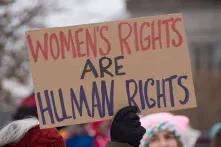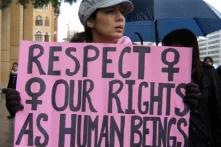Beijing+20 - Human Rights of Women
Human rights are women’s rights. This ought to be a matter of course throughout the world since 1979. It was, after all, in December 1979, that the General Assembly of the United Nations (UN) adopted its UN Convention on the Elimination of All Forms of Discrimination Against Women (CEDAW). The Convention prohibits discrimination against women in all areas of life and bound the nations to a plethora of measures that guarantee – legally and de facto – the equal participation of women in all areas of society. Despite this, women in many countries are still denied their rights. National legislation – for example, family law – frequently also contravenes CEDAW, and violence against women as a global problem in societies also represents an infringement of the human rights of women and their fundamental freedoms that frequently goes unpunished. With this in mind, the 1995 Beijing Platform for Action cited the following core demands:
- By governments: safeguard and promote the human rights of women
- Entrench the principle of gender equality in legislation
- Repeal discriminatory laws and legislation
- Access to information on human rights
Thus far, neither the rhetorical recognition of nor a call for women’s rights has been forthcoming. At times, they have instead led to increased resistance.
It is an undeniable fact that CEDAW has since been ratified by 187 of the 193 UN member states and an Optional Protocol has been adopted. And thanks to UN Resolution 1325 et. seqq. on “Women, Peace and Security”, sexualized violence has been defined as a crime against humanity and is therefore punishable before the International Criminal Court. In addition, the EU has also stepped up its efforts to counteract trafficking in women, whilst Arab countries have withdrawn some of their reservations against CEDAW.
However, Iran, Sudan and Somalia, for example, have not signed CEDAW and the USA has not ratified it. Some countries plead that their reservations are based on traditional, cultural or religious issues. The Optional Protocol granting women the right to submit complaints to the CEDAW Committee has not been signed by the majority of the Arab states.
Beijing+20 in the Regions
Good to Know
- Progress of the World's Women 2015/2016: detailed report by the UN Women on the economical barriers facing women, and strategies of improving the political participation of women on a global scale. more>>
- Beijing Platform for Action
Read the 1995 Beijing Declaration and Platform for Action here
[PDF].
An overview the Platform's 12 critical areas of concern by the UN Women. more>> - Women in Armed Conflicts: in the context of the CSW 59, the GWI co-hosted an event at concering a pressing issue for the Platform - women in armed conflicts. more>>
GWI-Newsletter
Beijing+20 - critical areas
- Women and poverty
- Education and training of women
- Women and health
- Violence against women
- Women and armed conflict
- Women and the economy
- Women in power and decision-making
- Institutional mechanisms for the advancement of women
- Human rights of women
- Women and the media
- Women and the environment
- The girl child
- Across Areas

